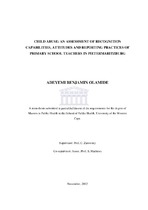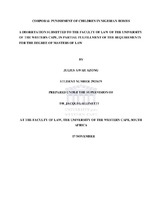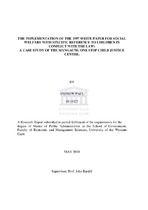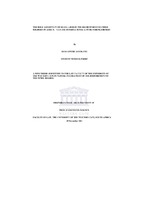| dc.description.abstract | Background: Child abuse is a global public health problem with serious consequences for the victims and society. Most studies on child maltreatment in South Africa have focused on the role of teachers as perpetrators and the prevalence of abuse within schools. Due to their strategic importance in breaking the cycle of abuse, it is important to document teachers‘ knowledge and attitudes towards identifying and reporting suspected cases of child abuse in relation to existing mandatory laws.Aim: To assess teachers‘ knowledge, attitudes and reporting practices of suspected child abuse in independent and public primary schools across all quintile categories in the Midlands education circuit in Pietermaritzburg.Methods: An observational, descriptive cross sectional quantitative study design was used. A self-administered questionnaire was completed by 237 teachers selected by multi-stage stratified proportional random sampling from a total of 2496 primary school teachers. The data were analysed using CDC Epi Info 7 (2012b). A descriptive analysis was done and groups were compared with chi square, ANOVA or Kruska-Wallis tests where appropriate. The level of significance was set as 95%.Results: The teachers were generally knowledgeable about possible indicators of child abuse. There were critical gaps in participants‘ knowledge of reporting procedures and most of the teachers (70.2%) have had no training on child abuse detection and reporting. Previous training on child abuse was associated with an increased likelihood to have detected abuse in the past (OR 4.86, 95%CI 2.64-8.96, p < 0.01). An overwhelming awareness of mandatory reporting law did not translate into knowledge of its provisions or substantial compliance. Hence, while most teachers agreed that all forms of child maltreatment should be reported, they still displayed differential reporting of suspected cases. The decision to report was often influenced by their perceived seriousness of the on-going abuse while uncertainty about on-going abuse was one of the most important barriers to lodging a report of suspected cases.
Conclusions and Recommendations: Teachers recognised child abuse as a serious issue and are willing to learn and do more. Teachers, and ultimately the children in their care, would immensely benefit from training repertoire which addresses identified contextual issues shaping teachers‘ child abuse detection and reporting practices. | en_US |




